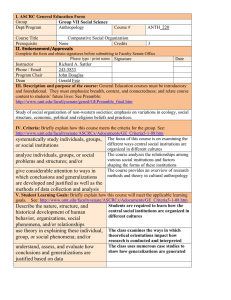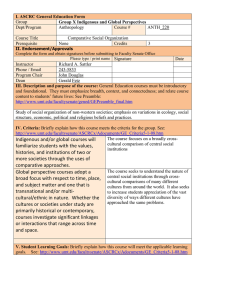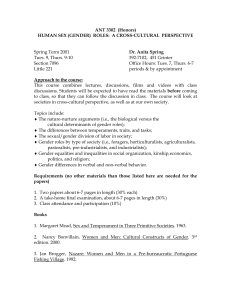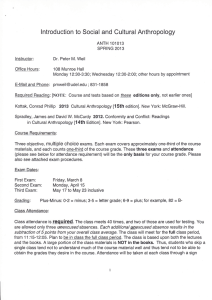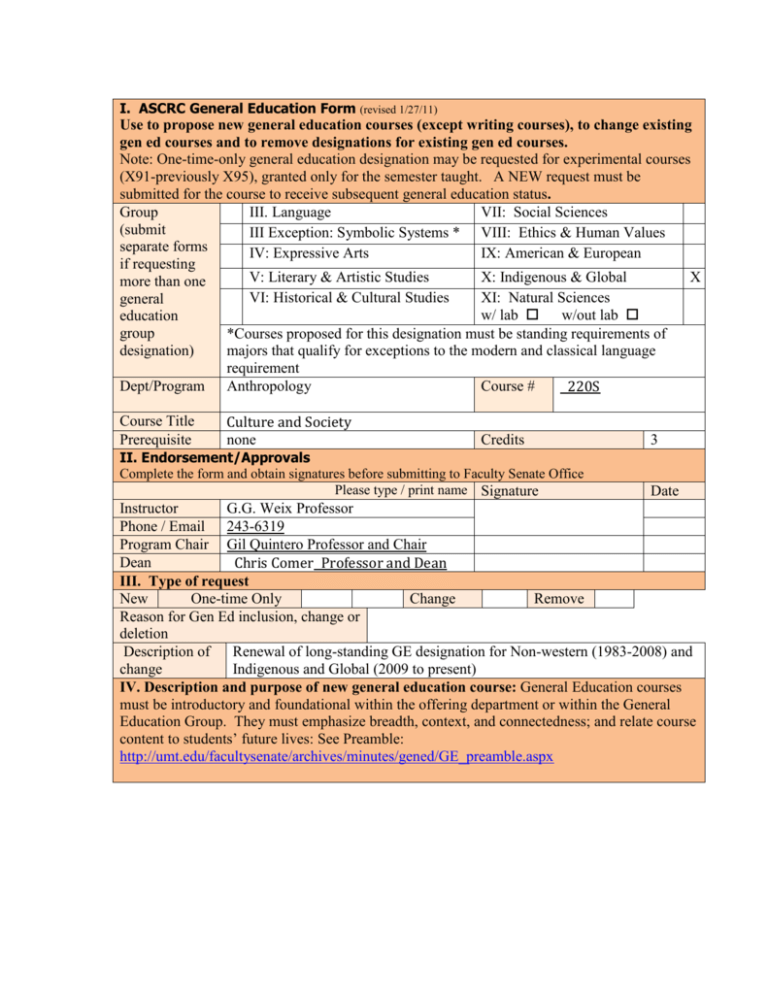
I. ASCRC General Education Form (revised 1/27/11)
Use to propose new general education courses (except writing courses), to change existing
gen ed courses and to remove designations for existing gen ed courses.
Note: One-time-only general education designation may be requested for experimental courses
(X91-previously X95), granted only for the semester taught. A NEW request must be
submitted for the course to receive subsequent general education status.
Group
III. Language
VII: Social Sciences
(submit
III Exception: Symbolic Systems * VIII: Ethics & Human Values
separate forms
IV: Expressive Arts
IX: American & European
if requesting
V: Literary & Artistic Studies
X: Indigenous & Global
X
more than one
VI: Historical & Cultural Studies
XI: Natural Sciences
general
w/ lab w/out lab
education
group
*Courses proposed for this designation must be standing requirements of
designation)
majors that qualify for exceptions to the modern and classical language
requirement
Dept/Program Anthropology
Course #
220S
Course Title
Prerequisite
Culture and Society
none
Credits
II. Endorsement/Approvals
Complete the form and obtain signatures before submitting to Faculty Senate Office
Please type / print name Signature
3
Date
Instructor
G.G. Weix Professor
Phone / Email 243-6319
Program Chair Gil Quintero Professor and Chair
Dean
Chris Comer Professor and Dean
III. Type of request
New
One-time Only
Change
Remove
Reason for Gen Ed inclusion, change or
deletion
Description of
Renewal of long-standing GE designation for Non-western (1983-2008) and
change
Indigenous and Global (2009 to present)
IV. Description and purpose of new general education course: General Education courses
must be introductory and foundational within the offering department or within the General
Education Group. They must emphasize breadth, context, and connectedness; and relate course
content to students’ future lives: See Preamble:
http://umt.edu/facultysenate/archives/minutes/gened/GE_preamble.aspx
This is the introductory and required course for the Major and Minor BA degree in
Anthropology. It is also an allied course for Native American Studies Major and Minor, and
was until this year, an allied course for Communication Studies Major (option in organizational
communication). The course presumes no knowledge of sociocultural anthropology, nor of
topics discussed, and engages the categories of comparative analysis of culture and society
through case studies of indigenous, small scale societies through ethnographic description, and
ethnological (comparative) analysis. Examples are from all continents, with an emphasis on
social institutions, structure and processes, as well as the diversity of human experience.
V. Criteria: Briefly explain how this course meets the criteria for the group. See:
http://umt.edu/facultysenate/documents/forms/GE_Criteria5-1-08.aspxme
Students learn content knowledge from a wide array of indigenous societies, as well as the
comparative approaches of sociocultural method and analysis. Students also learn the
holistic nature of anthropological knowledge, and through the social science perspective,
are introduced to different theories of social life that involve contextual and material
analysis of environment, subsistence, and relationship with state societies.
VI. Student Learning Goals: Briefly explain how this course will meet the applicable learning
goals. See: http://umt.edu/facultysenate/documents/forms/GE_Criteria5-1-08.aspx
The readings and exams focus student
learning on descriptions of other ways of
life, both in context, and in comparative
perspective. Students learn to identify
different aspects of social or cultural
organization, and to appreciate the
rationale or history for different modes of
living. Content knowledge is also stressed
in quizzes, films, and discussions.
VII. Justification: Normally, general education courses will not carry pre-requisites, will carry
at least 3 credits, and will be numbered at the 100-200 level. If the course has more than one
pre-requisite, carries fewer than three credits, or is upper division (numbered above the 200
level), provide rationale for exception(s).
Course is a 200 level introductory 3 credit class with no prerequisites.
VIII. Syllabus: Paste syllabus below or attach and send digital copy with form. The syllabus
should clearly describe how the above criteria are satisfied. For assistance on syllabus
preparation see: http://teaching.berkeley.edu/bgd/syllabus.html
Attached from adjunct instructor, Dr. Richard Sattler), sample assessment items are forwarded
to the Assessment Advisory Committee
Please note: Approved general education changes will take effect next fall.
General education instructors will be expected to provide sample assessment items and
corresponding responses to the Assessment Advisory Committee.
ANTHROPOLOGY 220S: Culture and Society
INSTRUCTOR: Dr. Richard A. Sattler
PHONE: 243-5833
OFFICE: SS 222
T/R 11:00-12:00n W 1:00-2:00pm or by appt
E-MAIL: richard.sattler@ umontana.edu
FALL 2013
SS 352
MWF 9:10-10:00pm
COURSE DESCRIPTION
This course provides an in-depth introduction to sociocultural anthropology, with an
emphasis on social organization. We will examine variations in marriage, family, and
kinship; economic and political systems; religious beliefs and practices; and social
hierarchies and stratification. We will also examine the ways that anthropologists study
and interpret cultural diversity, drawing on examples from both Western and, more
commonly, non-Western societies. There are no prerequisites. This course is required for
anthropology majors and minors and fulfills the general education social science
distribution requirement. The course is lecture based with opportunities for discussion of
lecture and films.
COURSE OBJECTIVES
Students will gain an appreciation of the diversity and richness of human social and
cultural systems
Students will acquire an understanding of the ways in which anthropologists study
societies and current issues and approaches;
Students will increase their knowledge of the nature, component elements, and
interconnections of social and cultural systems;
COURSE REQUIREMENTS
Examinations: There will five 100-point exams consisting of 50 True-False, Matching,
and Multiple-Choice questions covering lectures, films, classroom presentations, and
readings. None of the exams is comprehensive and the lowest grade will be dropped. All
students must take the last exam. Students will need to bring a narrow red scantron sheet
and a number 2 pencil to class on the day of the exam;
Grading Scale: Exams - 100-90=A, 89-80=B, 79-70=C, 69-60=D, 59-0=F;
Course - 400-360=A, 359-320=B, 319-280=C, 279-240=D, 239-0=F;
Attendance: Students are expected to attend all classes and are personally responsible for
all material covered in class. Tests cover both readings and classroom presentations
equally. There may be pop quizzes;
Make-Ups: Students are expected to do all work on the scheduled date listed in the
syllabus. Make-ups will only be given in the case of unavoidable absences. It is the
student’s responsibility to contact the instructor as soon as possible (within 1 week of
return to classes) in such cases and to arrange for a make-up;
Extra Credit: Students may earn extra credit by writing a 2-4 page critical review of a
book selected from the approved list available on Moodle. Guidelines for the reviews are
also available there. This review is worth up to 10 points. Other extra credit opportunities
may be available during the semester as well and will be announced in class and posted on
Moodle. All extra credit papers must be posted to Moodle by midnight on Friday Dec 6,
2013.
Academic Honesty: The University of Montana expects students to be academically
honest. Cheating and plagiarism are serious offences carrying serious penalties under the
student code. Consult the “Academic Policies and Procedures” section of the current
University catalog for details regarding penalties;
Access: This syllabus, along with study guides, lecture notes, announcements, etc., are
available on-line through the university’s Moodle system.
Required Readings: Bonvillain, Nancy. Cultural Anthropology. New York:
Pearson/Prentice Hall, 2013
OUTLINE
WEEK 1 INTRODUCTION
READINGS: Bonvillain, Ch. 1; Spradley & McCurdy, Ch. 36-40
Aug 26 (Wed) - Video: “Nature of Anthropology” (30)
Aug 30 (Fri) - Video: “Off the verandah” (53)
WEEK 2 THEORY AND PRACTICE
READINGS: Bonvillain, Ch. 3; Spradley & McCurdy, Ch. 1, 3-4
Sep 2 (Mon) Labor Day Holiday
WEEK 3 CULTURE
READINGS: Bonvillain, Ch. 2, 5; Spradley & McCurdy, Ch. 2; 5-8
Sep 13 (Fri) FIRST EXAM
WEEK 4 SUBSISTENCE
READINGS: Bonvillain, Ch. 6; Spradley & McCurdy, Ch. 9-12
Sep 16 (Mon) - Video: “Hunters and Gatherers” ()
WEEK 5 ECONOMICS
READINGS: Bonvillain, Ch. 7; Spradley & McCurdy, Ch. 13-16
Sep 23 (Mon) - Video: “Ongka’s Big Moka“ (60)
WEEK 6 POLITICS
READINGS: Bonvillain, Ch. 12-13; Spradley & McCurdy, Ch. 25-27
Oct 4 (Fri) SECOND EXAM
WEEK 7 EQUALITY & INEQUALITY
READINGS: Bonvillain, Ch. 11;
Oct 7 (Mon) - Video: “Principles of Caste “ (30) & “The Aymara: A Case Study in Social
Stratification” (30)
WEEK 8 MARRIAGE & FAMILY
READINGS: Bonvillain, Ch. 9; Spradley & McCurdy, Ch. 17, 19
Oct 14 (Mon) - Video: “Dadi’s Family” (60)
WEEK 9 KINSHIP & DESCENT
READINGS: Bonvillain, Ch. 8; Spradley & McCurdy, Ch. 18, 20
Oct 25 (Fri) THIRD EXAM
WEEK 10 GENDER & AGE
READINGS: Bonvillain, Ch. 10; Spradley & McCurdy, Ch. 22-23
Oct 28 (Mon) - Video: “Masai Women” (60)
WEEK 11 ETHNICITY & NATIONALISM READINGS: Spradley & McCurdy, Ch. 24
Nov 4 (Mon) - Video: “Awara Soup” (68)
WEEK 12 RELIGION & WORLDVIEW
READINGS: Bonvillain, Ch. 14; Spradley & McCurdy, Ch. 28-31
Nov 15 (Fri) FOURTH EXAM
WEEK 13 GLOBALISM & MODERNITY
READINGS: Bonvillain, Ch. 16-17; Spradley & McCurdy, Ch. 32-35
WEEK 14 GLOBALISM & MODERNITY
Nov 25 (Mon) - Video: “Globalization & human rights “ (57)
Nov 27-30 Thanksgiving Holiday
WEEK 15 ART & AESTHETICS
READINGS: Bonvillain, Ch.15
Dec 2 (Mon) - Video: “Crooked Beak of Heaven” (55)
FINALS WEEK
Dec 13 (Fri) – 8:10-10:00 am FIFTH EXAM

